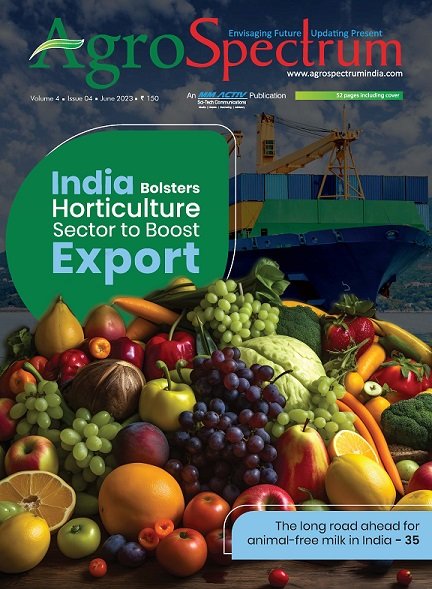Friday, 20 February 2026

Recently, the government has permitted five private firms to undertake cluster farming of specific horticulture crops on a pilot basis in approximately 50,000 hectares with an investment of Rs 750 crore. The government is progressively adopting a cluster value-chain-based approach to position Indian horticulture as a leader in the global market. The utilisation of artificial intelligence (AI) and the Internet of Things (IoT) in providing end-to-end solutions for growers and buyers, the establishment of more horticulture clusters, financial support from the government and private sector, and improved infrastructure for storage and logistics will contribute to making the horticulture supply chain more robust.
The horticulture sector, which contributes approximately 33 per cent of the gross value of agricultural GDP, is emerging as a key driver of economic growth and transitioning into an organised industry encompassing seed trading, value addition, and exports. India holds the second position globally in fruits and vegetable production, following China, as per data from the Agricultural and Processed Food Products Export Development Authority (APEDA). In the fiscal year 2021-22, the country exported fresh fruits and vegetables worth Rs 11,412.50 crore, with major destinations including Bangladesh, UAE, Nepal, Netherlands, Malaysia, Sri Lanka, the UK, Oman, and Qatar. The total horticulture production in 2021-22 stood at approximately 341.63 million tonnes, comprising fruit production of around 107.10 million tonnes and vegetable production of around 204.61 million tonnes. APEDA has set an export target of $23.56 billion for the agricultural and processed food products basket in 2022-23, with $13.77 billion already achieved in the first half of the fiscal. During April-September 2022, processed fruits and vegetables witnessed a remarkable growth of 42.42 per cent, while fresh fruits recorded a growth of 4 per cent compared to the same period of the previous year.
However, the export growth is hindered by challenges such as inadequate adherence to international quality standards, marketing difficulties, inadequate transportation infrastructure, fragmented supply chains, and insufficient storage facilities. These factors lead to delays, wastage, and discourage farmers from improving the quality of their produce. The perishable nature of fruits and vegetables poses additional challenges to the horticulture marketing chain, making efficient storage and transportation problematic. Poor logistics, limited cold storage and warehousing facilities contribute to further delays and wastages. To address these challenges, the government has allocated Rs 2,200 crore in the Union Budget of 2023 for the development of the horticulture sector. This provision aims to promote the availability of disease-free, high-quality planting material for valuable horticultural crops. Additionally, the government has permitted five private firms to undertake cluster farming of specific horticulture crops on a pilot basis in approximately 50,000 hectares with an investment of Rs 750 crore. The government is progressively adopting a cluster value-chain-based approach to position Indian horticulture as a leader in the global market. The utilisation of artificial intelligence (AI) and the Internet of Things (IoT) in providing end-to-end solutions for growers and buyers, the establishment of more horticulture clusters, financial support from the government and private sector, and improved infrastructure for storage and logistics will contribute to making the horticulture supply chain more robust.
On April 10, the Indian government granted permission to five private firms to undertake cluster farming of specific horticulture crops on a pilot basis in about 50,000 hectares. This initiative, entailing an investment of Rs 750 crore, including government subsidy, aims to enhance the global competitiveness of Indian produce and boost farmers’ income.
The selected companies for pilot cluster farming through a bidding process are Desai Agrifoods, FIL Industries, Sahyadri Farms, Meghalaya Basin Management Agency, and Prasad Seeds. Under the recently launched central scheme Cluster Development Programme (CDP), implemented by the National Horticulture Board (NHB) with a budget of Rs 2,200 crore, the centre will provide financial assistance of up to Rs 100 crore, depending on the project’s size.
This marks the first time in India that the government is encouraging market-led development of the entire value chain of specific horticulture crops through financial support. These five companies are spread across an area of almost 50,000 hectares and cover around 55,000 farmers. The investment within these clusters is about Rs 750 crore.
Desai Agrifoods will develop a ‘Banana cluster’ project in Ananthapura, Andhra Pradesh, with a budget of Rs 103 crore. Sahyadri Farms will establish a ‘Grapes cluster’ project in Nasik, Maharashtra, with a budget of Rs 205 crore. Meghalaya Basin Management Agency will develop a ‘Turmeric cluster’ project in West Jaintia Hills, with a budget of Rs 52 crore. FIL Industries will focus on an ‘Apple cluster’ in Shopian, Jammu and Kashmir, and Prasad Seeds will undertake a ‘Mango cluster’ project in Mahabubnagar, Telangana.
The primary crops of focus for these companies will be banana, apple, grapes, turmeric and mango. The projects are expected to be completed and operational within a timeline of four years. The government’s goal is to develop 55 different clusters identified across the country, each dedicated to a specific crop. Initially, the pilot phase will cover 12 clusters and focus on seven crops.
To read more click on: https://agrospectrumindia.com/e-magazine